高译教育-北京第二外国语学院考研真题综合考试(日本概况)真题2005
2005年对北京外国语大学日本学研究中心基础日语考研真题(含答案)(圣才出品)
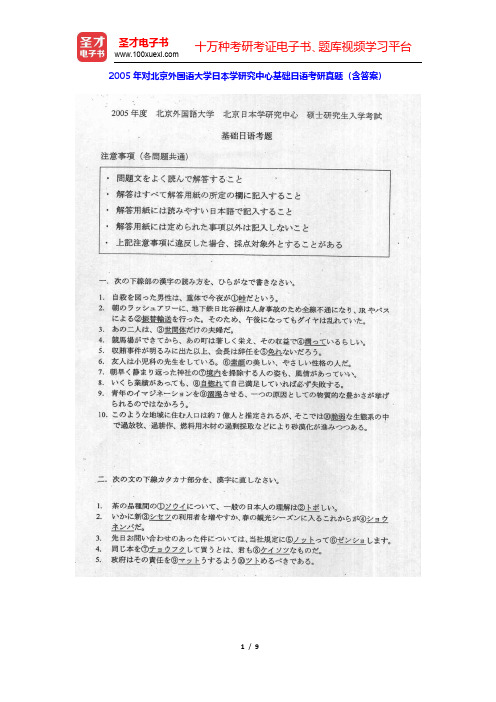
2005 年对北京外国语大学日本学研究中心基础日语考研真题(含答案)
1/9
圣才电子书 十万种考研考证电子书、题库视频学习平台
2/9
圣才电子书 十万种考研考证电子书、题库视频学习平台
3/9
圣才电子书 十万种考研考证电子书、题库视频学习平台
4/9
圣才电子书 十万种考研考证电子书、题库视频学习平台
5/9
圣才电子书 十万种考研考证电子书、题库视频学习平台
6/9
圣才电子书 十万种考研考证电子书、题库视频学习平台
7/9
圣才电子书 十万种考研考证电子书、题库视频学习平台
8/9
圣才电子书 十万种考研考证电子书、题库
2005年日语能力考试2级真题-文字词汇
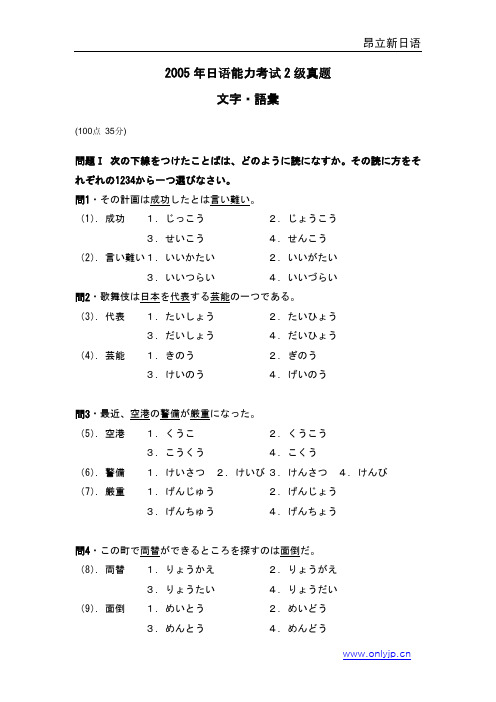
2005年日语能力考试2级真题文字・語彙(100点 35分)問題Ⅰ 次の下線をつけたことばは、どのように読になすか。
その読に方をそれぞれの1234から一つ選びなさい。
問1・その計画は成功したとは言い難い。
(1).成功 1.じっこう 2.じょうこう3.せいこう 4.せんこう(2).言い難い1.いいかたい 2.いいがたい3.いいつらい 4.いいづらい問2・歌舞伎は日本を代表する芸能の一つである。
(3).代表 1.たいしょう 2.たいひょう3.だいしょう 4.だいひょう(4).芸能 1.きのう 2.ぎのう3.けいのう 4.げいのう問3・最近、空港の警備が厳重になった。
(5).空港 1.くうこ 2.くうこう3.こうくう 4.こくう(6).警備 1.けいさつ 2.けいび 3.けんさつ 4.けんび (7).厳重 1.げんじゅう 2.げんじょう3.げんちゅう 4.げんちょう問4・この町で両替ができるところを探すのは面倒だ。
(8).両替 1.りょうかえ 2.りょうがえ3.りょうたい 4.りょうだい(9).面倒 1.めいとう 2.めいどう3.めんとう 4.めんどう問5・ここ数年、高校、大学への進学率はやや減っているようだ。
(10).数年 1.すうねん 2.すねん 3.そうねん 4.そねん (11).進学率 1.しんがくいつ 2.しんがくいつ3.しんがくそつ 4.しんがくりつ (12).減って 1.あまって 2.いたって 3.そって 4.へって問6・君は賢い 選択をしたね。
(13).賢い 1.かしこい 2.きつい 3.すごい 4.するどい (14).選択 1.せいたく 2.ぜいたく 3.せんたく 4.ぜんたく問7・この町の主な産業は漁業だ。
(15).主な 1.あらたな 2.おもな 3.まれな 4.ゆたかな (16).漁業 1.ぎょうぎょう 2.ぎょぎょう3.りょうぎょう 4.りょぎょう問8・アジア諸国の経済について講演を行った。
2005年日语能力考二级真题读解部分03

2005年日语能力考二级真题读解部分。
考生们在日语备考中都会看大量资料,做大量习题来提高日语水平,可是在能力考前还是不能确定自己的掌握情况,那就让往年二级真题来帮你检测一下吧!問題Ⅲ次の(1)から(5)の文章を読んで、それぞれの問いに対する答えとして最も適当なものを1・2・3・4から一つ選びなさい。
(1) 子どもたちの何かが変わってきた——。
いまの子どもたちが一番変わったところは、自分を語れなくなったこと。
少し前の子どもたちは、「どうして悪いことをしてしまったの.」と問いかけると、「どうしてそうなっちゃったんだろう」と、それなりに(注)一生懸命考えて答えを出してよこしたものだが、いま、そう問いかけても答えられなくなくている。
おしゃベリはよくするのに、自分の心を言葉にするのは苦手で、自分を理解してもらおうという努力がないのである。
これは、自分を語るという場が少なく、経験もないからに違いない。
(野代仁子『非行を叱る~カウンセラーのノートから』文藝春秋による)(注)それなりに:その入ができる範囲で【問い】少し前の子どもと比べて、いまの子どもが変わったところはどんな点か。
1 自分の気持ちを口に出すことができなくなったこと2 自分の心を言葉で言い表すことがじょうずになったこと3 自分を語る機会が増えて、おしゃべりをよくするようになったこと4 悪いことをした理由を聞かれた時、よく考えないと答えられなくなったこと(2) イアン様先日はお便りありがとうございました。
こちらこそごぶさたしております。
卒業記念発表会のご案内状もありがとうございました。
ホームステイでわが家にいらっしゃった時は、まだ来日なさったばかりでしたのに、もう2年にもなるのですね。
ほんとうに早いものです。
あの時はほとんど日本語が話せなかったので心配でしたが、発表会では大勢の人の前で日本語で話されるのですね。
本当に驚きました。
発表会へは、家族そろって、うかがうつもりです。
05日语真题
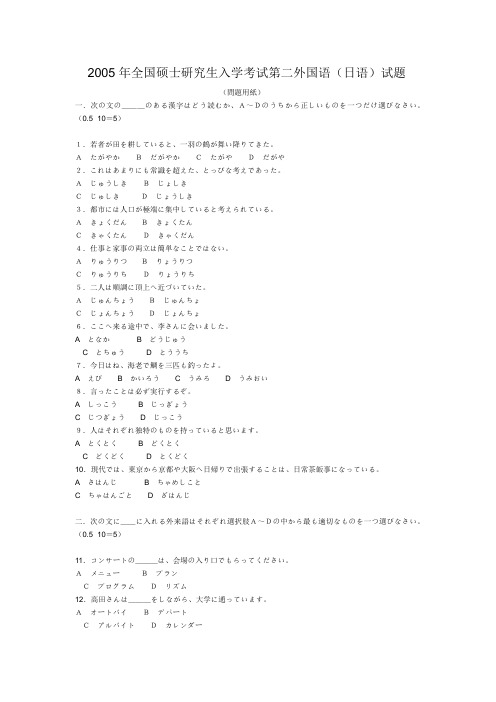
2005年全国硕士研究生入学考试第二外国语(日语)试题(問題用紙)一.次の文の___のある漢字はどう読むか、A~Dのうちから正しいものを一つだけ選びなさい。
(0.5×10=5)1.若者が田を耕していると、一羽の鶴が舞い降りてきた。
AたがやかBだがやかCたがやDだがや2.これはあまりにも常識を超えた、とっぴな考えであった。
AじゅうしきBじょしきCじゅしきDじょうしき3.都市には人口が極端に集中していると考えられている。
AきょくだんBきょくたんCきゃくたんDきゃくだん4.仕事と家事の両立は簡単なことではない。
AりゅうりつBりょうりつCりゅうりちDりょうりち5.二人は順調に頂上へ近づいていた。
AじゅんちょうBじゅんちょCじょんちょうDじょんちょ6.ここへ来る途中で、李さんに会いました。
AとなかBどうじゅうCとちゅうDとううち7.今日はね、海老で鯛を三匹も釣ったよ。
AえびBかいろうCうみろDうみおい8.言ったことは必ず実行するぞ。
AしっこうBじっぎょうCじつぎょうDじっこう9.人はそれぞれ独特のものを持っていると思います。
AとくとくBどくとくCどくどくDとくどく10.現代では、東京から京都や大阪へ日帰りで出張することは、日常茶飯事になっている。
AさはんじBちゃめしことCちゃはんごとDざはんじ二.次の文に__に入れる外来語はそれぞれ選択肢A~Dの中から最も適切なものを一つ選びなさい。
(0.5×10=5)11.コンサートの___は、会場の入り口でもらってください。
AメニューBプランCプログラムDリズム12.高田さんは___をしながら、大学に通っています。
AオートバイBデパートCゕルバイトDカレンダー13.自動車や機械などを操作するために__を回す。
AパイプBボタンCピンDハンドル14.今年、文学賞をもらった作家に新聞記者が__をして記事を書いた。
AインタビューBステージCレクリエーションDコンクール15.有名なレストランに出かけたが、店は休みで__が閉まっていた。
2005年北京外国语大学二外法语真题及详解【圣才出品】
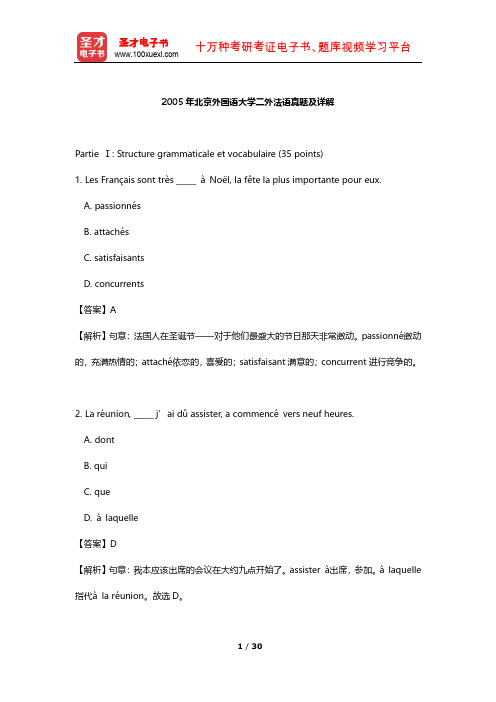
2005年北京外国语大学二外法语真题及详解Partie Ⅰ: Structure grammaticale et vocabulaire (35 points)1. Les Français sont très _____ àNoël, la fête la plus importante pour eux.A. passionnésB. attachésC. satisfaisantsD. concurrents【答案】A【解析】句意:法国人在圣诞节——对于他们最盛大的节日那天非常激动。
passionné激动的,充满热情的;attaché依恋的,喜爱的;satisfaisant满意的;concurrent进行竞争的。
2. La réunion, _____ j’ai dû assister, a commencévers neuf heures.A. dontB. quiC. queD. àlaquelle【答案】D【解析】句意:我本应该出席的会议在大约九点开始了。
assister à出席,参加。
àlaquelle 指代àla réunion。
故选D。
3. Bien qu’on _____ un billet, je _____ au cinéma.A. m’avait donné; ne serai pas alléB. m’a donné; ne suis pas alléC. m’ait donné; ne suis pas alléD. me donne ; n’irais pas【答案】C【解析】句意:尽管有人给了我一张票,我还是没有去电影院。
bien que后面要加虚拟式。
2005 年考研日语(203)真题 全文本翻译

一 基础知识 任何人都不想见,也不想开口说话。然后,只是一个人一动不动的呆着。这种感觉时常 会出现。这并不是意志沮丧,而是感情沉思。 我只要看见了纯白或者纯黑的猫,不论是多少只我都想饲养。而且,最好不要是外国品 种那种放在室内养的, 而是那种具有野性的能自由在户外到处跑的那种。 人工培育的那种短 尾巴的也不行,要是那种天生就是长尾巴最好不过了。 不过,要说为什么(喜欢养猫) 。可以说,猫是宠物中最能贴近人类生活的。在屋内与 人同居,一起饮食,一起睡觉。要是想叫它,如果和人合得来,用嗓子吼几下它就会过来了, 反之,再怎么召唤也没用,它只会若无其事的向着另一边。有人说“猫是最会察言观色的” , (实际上)经常无视人的脸色。在庭院角落,走廊边缘,桌子上,只是一动不动的蹲着幻想 着。 在它的幻想当中, 也许也有肉食动物本来的野性吧。 我认为在它的内心中也许还残留着 什么驯服不了的东西吧。 由此来看,我也能从中感受一些自己的内心。不想去见别人,也不想说话,一个人呆着 不动的时候,我那种消沉的感觉,只是一种伦理上的习惯,换言之,这只是世间万物的一种 一般的特性,在此深处,心中的某处也潜伏着某种野性吧。跟驯服小猫同一个道理,在人类 内心中也有某种不能完全被颠覆的某种东西,很多艺术性(东西)正是在这种野性当中所萌 芽的。 艺术作为一种创造性的要素, 这是建立在这种无法驯服的强烈野性的某种东西上。 当没 有这种建设条件时,就失去了创造艺术的要素,生命力就变得薄弱。 猫的野性,就存在于温顺的外表所看不到的地方之中,这种野性既是猫的内在,也是它 的幻想。 (人们)对于它内在的野性感到惊异和恐吼,创造了很多有关猫的传说。有关猫的 迷信传闻美化的内容居多,比如在报恩或者复仇之类的故事当中,发挥了不可思议的力量, 迅速展开了(故事情节) 。 二 阅读 A 1 在我小的时候,去买东西的话,很多情况下都是没有定好价的。因此,跟店里面的人交往 熟识、买东西的讨价还价的技巧是很重要的。买同样一个东西,如果没有掌握好技巧失败了 的话,就会以高价买下。日常积累的交情,在买东西的时候,会发挥很重要的作用 这一点,从某种意义上讲,是一件不公平的事情。买同一件东西,根据对手不同价格也 不一样。一旦(交流)失败的话,就会蒙受损失。 现在,商品都是定价了。为了公平,谁都可以以同样的价格来购物。但是,有时候也会 感到一点乏味。想掌握最重要的(交涉)要领,但是可以努力的(机会)却没有了。想跟店 里的人搞好关系,平时开始注意的(交流)也没有了。公平换来的是,关系变得日益冷淡。 经历了数次失败后,渐渐地就记住了要领。也就是说,店里的人就是(传授)要领的老 师。 所谓“讲价” ,就是作为买家也在(商品)价格上阐述自己的意愿。不是在标定好的价格 上单单决定买与不买。进行了“讲价”之后,即使那个价格仍然很高,那也属于买家的责任。 也是是说, (按照)自己意愿,自己负责,自己判断价格是否还留有(砍价的)余地。 与之相反的是,在平等、公正的名义下,让自己来判断、负责的机会,不是越来越少了 吗?再加上,学校之类地方都是集体订购东西的,让人感觉(这种机会)离自己越来越来越 远了。
日本社会文化考研全国名校考研真题解析

日本社会文化考研全国名校考研真题解析1、北京第二外国语学院日本社会文化考研真题及详解(2014—2015)北京第二外国语学院2015年日本社会文化考研真题及详解考试科目:综合考试(日)一、填空,用中文或日文回答都可以。
(每空0.5分,共15分)1.日本的国土自北向南分成北海道、东北、关东、(1)、(2)、(3)、四国、九州8个地区,这不是行政区划,是根据产业和历史变迁而划分的。
【答案】中部、近畿、中国查看答案2.日本河流短,水量变化大,水流湍急,不利于发展水上交通运输。
最长的河流叫(4),长度367公里。
【答案】信浓川查看答案3.日本近海有许多世界著名的渔场,其成因与周围的海流关系密切。
沿太平洋海岸北上的暖流(5)和南下的(6)相遇,沿日本海一侧北上的暖流(7)和寒流リマン海流相遇,具备了形成渔场的条件。
【答案】日本暖流、千岛寒流、对马暖流查看答案4.日本目前的执政党是由(8)、(9)联合执政。
【答案】自民党、公明党查看答案5.日本法院实行三审制,一审由(10)、二审由(11)审判。
内阁由(12)及其他国务大臣组成。
日本的选举根据《公职选举法》进行,一般分成国政选举和(13)。
【答案】地方法院、高等法院、内阁总理大臣、地方议会选举查看答案6.战后美国占领军在经济领域推行了民主化,同时实施了振兴经济政策,推动了日本经济发展走上轨道。
这些政策包括(14)、(15)。
其中(16)对日本重工业的发展发挥了重要作用。
【答案】解散财阀、农地改革、解散财阀查看答案7.所谓“平成不況”的特征表现为(17)、金融机关背负大量的(18)。
【答案】消费不景气、不良债权查看答案8.2015年是日本的平成(19)年。
【答案】27查看答案9.大相扑的等级叫“番付”,最高的地位是“横纲”。
十两以上的力士叫“关取”,“小结”、(20)、(21)叫“三役”。
【答案】关胁、大关查看答案10.日本社会治安好是因为有独特的(22)制度。
2005年5月日语二级笔译综合能力试题
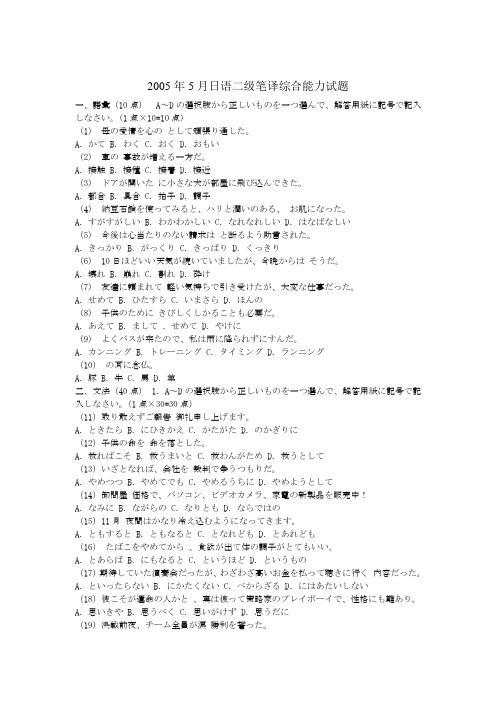
2005年5月日语二级笔译综合能力试题一、語彙(10点) A~Dの選択肢から正しいものを一つ選んで、解答用紙に記号で記入しなさい。
(1点×10=10点)(1)母の愛情を心のとして頑張り通した。
A.かて B.わく C.おく D.おもい(2)車の事故が増える一方だ。
A.接触 B.接種 C.接着 D.接近(3)ドアが開いたに小さな犬が部屋に飛び込んできた。
A.都合 B.具合 C.拍子 D.調子(4)納豆石鹸を使ってみると、ハリと潤いのある、お肌になった。
A.すがすがしい B.わかわかしい C.なれなれしい D.はなばなしい(5)今後は心当たりのない請求はと断るよう助言された。
A.きっかり B.がっくり C.きっぱり D.くっきり(6) 10日ほどいい天気が続いていましたが、今晩からはそうだ。
A.壊れ B.崩れ C.割れ D.砕け(7)友達に頼まれて軽い気持ちで引き受けたが、大変な仕事だった。
A.せめて B.ひたすら C.いまさら D.ほんの(8)子供のためにきびしくしかることも必要だ。
A.あえて B.まして.せめて D.やけに(9)よくバスが来たので、私は雨に降られずにすんだ。
A.カンニング B.トレーニング C.タイミング D.ランニング(10)の耳に念仏。
A.豚 B.牛 C.馬 D.羊二、文法(40点) 1.A~Dの選択肢から正しいものを一つ選んで、解答用紙に記号で記入しなさい。
(1点×30=30点)(11)取り敢えずご報告御礼申し上げます。
A.ときたら B.にひきかえ C.かたがた D.のかぎりに(12)子供の命を命を落とした。
A.救ればこそ B.救うまいと C.救わんがため D.救うとして(13)いざとなれば、会社を裁判で争うつもりだ。
A.やめつつ B.やめてでも C.やめるうちに D.やめようとして(14)卸問屋価格で、パソコン、ビデオカメラ、家電の新製品を販売中!A.なみに B.ながらの C.なりとも D.ならではの(15)11月夜間はかなり冷え込むようになってきます。
外研社 日语能力考试真题解析2级 听力和阅读翻译2005
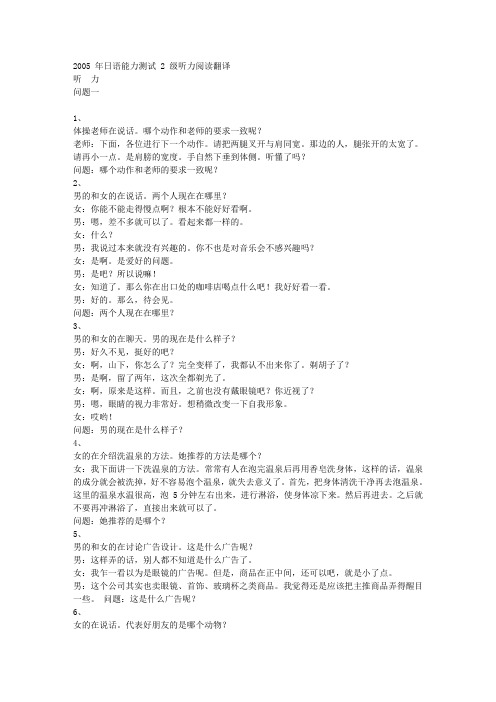
2005 年日语能力测试 2 级听力阅读翻译听力问题一1、体操老师在说话。
哪个动作和老师的要求一致呢?老师:下面,各位进行下一个动作。
请把两腿叉开与肩同宽。
那边的人,腿张开的太宽了。
请再小一点。
是肩膀的宽度。
手自然下垂到体侧。
听懂了吗?问题:哪个动作和老师的要求一致呢?2、男的和女的在说话。
两个人现在在哪里?女:你能不能走得慢点啊?根本不能好好看啊。
男:嗯,差不多就可以了。
看起来都一样的。
女:什么?男:我说过本来就没有兴趣的。
你不也是对音乐会不感兴趣吗?女:是啊。
是爱好的问题。
男:是吧?所以说嘛!女:知道了。
那么你在出口处的咖啡店喝点什么吧!我好好看一看。
男:好的。
那么,待会见。
问题:两个人现在在哪里?3、男的和女的在聊天。
男的现在是什么样子?男:好久不见,挺好的吧?女:啊,山下,你怎么了?完全变样了,我都认不出来你了。
剃胡子了?男:是啊,留了两年,这次全都剃光了。
女:啊,原来是这样。
而且,之前也没有戴眼镜吧?你近视了?男:嗯,眼睛的视力非常好。
想稍微改变一下自我形象。
女:哎哟!问题:男的现在是什么样子?4、女的在介绍洗温泉的方法。
她推荐的方法是哪个?女:我下面讲一下洗温泉的方法。
常常有人在泡完温泉后再用香皂洗身体,这样的话,温泉的成分就会被洗掉,好不容易泡个温泉,就失去意义了。
首先,把身体清洗干净再去泡温泉。
这里的温泉水温很高,泡 5分钟左右出来,进行淋浴,使身体凉下来。
然后再进去。
之后就不要再冲淋浴了,直接出来就可以了。
问题:她推荐的是哪个?5、男的和女的在讨论广告设计。
这是什么广告呢?男:这样弄的话,别人都不知道是什么广告了。
女:我乍一看以为是眼镜的广告呢。
但是,商品在正中间,还可以吧,就是小了点。
男:这个公司其实也卖眼镜、首饰、玻璃杯之类商品。
我觉得还是应该把主推商品弄得醒目一些。
问题:这是什么广告呢?6、女的在说话。
代表好朋友的是哪个动物?女:在我们国家,可以根据梦见的动物来圆梦。
通常情况下,白色的动物象征幸运。
2005 考研英语二真题及答案解析
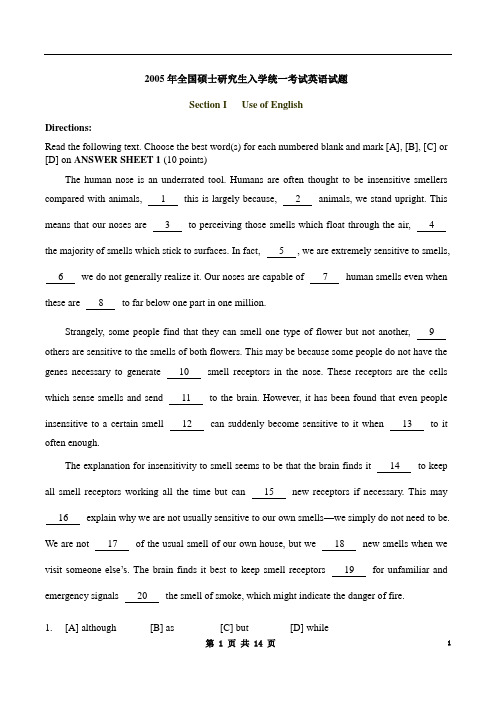
2005年全国硕士研究生入学统一考试英语试题Section I Use of EnglishDirections:Read the following text. Choose the best word(s) for each numbered blank and mark [A], [B], [C] or [D] on ANSWER SHEET 1 (10 points)The human nose is an underrated tool. Humans are often thought to be insensitive smellers compared with animals, 1this is largely because, 2animals, we stand upright. This means that our noses are 3to perceiving those smells which float through the air, 4the majority of smells which stick to surfaces. In fact, 5, we are extremely sensitive to smells, 6we do not generally realize it. Our noses are capable of 7human smells even when these are 8to far below one part in one million.Strangely, some people find that they can smell one type of flower but not another, 9 others are sensitive to the smells of both flowers. This may be because some people do not have the genes necessary to generate 10smell receptors in the nose. These receptors are the cells which sense smells and send 11to the brain. However, it has been found that even people insensitive to a certain smell 12can suddenly become sensitive to it when 13to it often enough.The explanation for insensitivity to smell seems to be that the brain finds it 14to keep all smell receptors working all the time but can 15new receptors if necessary. This may 16explain why we are not usually sensitive to our own smells—we simply do not need to be. We are not 17of the usual smell of our own house, but we 18new smells when we visit someone else’s. The brain finds it best to keep smell receptors 19for unfamiliar and emergency signals 20the smell of smoke, which might indicate the danger of fire.1. [A] although [B] as [C] but [D] while2. [A] above [B] unlike [C] excluding [D] besides3. [A] limited [B] committed [C] dedicated [D] confined4. [A] catching [B] ignoring [C] missing [D] tracking5. [A] anyway [B] though [C] instead [D] therefore6. [A] even if [B] if only [C] only if [D] as if7. [A] distinguishing [B] discovering [C] determining [D] detecting8. [A] diluted [B] dissolved [C] dispersed [D] diffused9. [A] when [B] since [C] for [D] whereas10. [A] unusual [B] particular [C] unique [D] typical11. [A] signs [B] stimuli [C] messages [D] impulses12. [A] at first [B] at all [C] at large [D] at times13. [A] subjected [B] left [C] drawn [D] exposed14. [A] ineffective [B] incompetent [C] inefficient [D] insufficient15. [A] introduce [B] summon [C] trigger [D] create16. [A] still [B] also [C] otherwise [D] nevertheless17. [A] sure [B] sick [C] aware [D] tired18. [A] tolerate [B] repel [C] neglect [D] notice19. [A] available [B] reliable [C] identifiable [D] suitable20. [A] similar to [B] such as [C] along with [D] aside fromSection II Reading ComprehensionPart ADirections:Read the following four texts. Answer the questions below each text by choosing [A], [B], [C] or D. Mark your answers on ANSWER SHEET 1 (40 points)Text 1Everybody loves a fat pay rise. Yet pleasure at your own can vanish if you learn that a colleague has been given a bigger one. Indeed, if he has a reputation for slacking, you might even be outraged. Such behaviour is regarded as “all too human,” with the underlying assumption that other animals would not be capable of this finely developed sense of grievance. But a study by Sarah Brosnan and Frans de Waal of Emory University in Atlanta, Georgia, which has just been published in Nature, suggests that it is all too monkey, as well.The researchers studied the behaviour of female brown capuchin monkeys. They look cute. They are good-natured, co-operative creatures, and they share their food readily. Above all, like their female human counterparts, they tend to pay much closer attent ion to the value of “goods and services” than males.Such characteristics make them perfect candidates for Dr. Brosnan’s and Dr. de W aal’s study. The researchers spent two years teaching their monkeys to exchange tokens for food. Normally, the monkeys were happy enough to exchange pieces of rock for slices of cucumber. However, when two monkeys were placed in separate but adjoining chambers, so that each could observe what the other was getting in return for its rock, their behaviour became markedly different.In the world of capuchins, grapes are luxury goods (and much preferable to cucumbers). So when one monkey was handed a grape in exchange for her token, the second was reluctant to hand hers over for a mere piece of cucumber. And if one received a grape without having to provide her token in exchange at all, the other either tossed her own token at the researcher or out of the chamber, or refused to accept the slice of cucumber. Indeed, the mere presence of a grape in the other chamber (without an actual monkey to eat it) was enough to induce resentment in a female capuchin.The researchers suggest that capuchin monkeys, like humans, are guided by social emotions. In the wild, they are a co-operative, group-living species. Such co-operation is likely to be stable only when each animal feels it is not being cheated. Feelings of righteous indignation, it seems, are not the preserve of people alone. Refusing a lesser reward completely makes these feelings abundantly clear to other members of the group. However, whether such a sense of fairness evolved independently in capuchins and humans, or whether it stems from the common ancestor that the species had 35 million years ago, is, as yet, an unanswered question.21. In the opening paragraph, the author introduces his topic by ________.[A] posing a contrast[B] justifying an assumption[C] making a comparison[D] explaining a phenomenon22. The statement “it is all too monkey” (Last line, Paragraph l) implies that ________.[A] monkeys are also outraged by slack rivals[B] resenting unfairness is also monkeys’ nature[C] monkeys, like humans, tend to be jealous of each other[D] no animals other than monkeys can develop such emotions23. Female capuchin monkeys were chosen for the research most probably because they are________.[A] more inclined to weigh what they get[B] attentive to researchers’ instructions[C] nice in both appearance and temperament[D] more generous than their male companions24. Dr. Brosnan and Dr. de Waal have eventually found in their study that the monkeys ________.[A] prefer grapes to cucumbers[B] can be taught to exchange things[C] will not be co-operative if feeling cheated[D] are unhappy when separated from others25. What can we infer from the last paragraph?[A] Monkeys can be trained to develop social emotions.[B] Human indignation evolved from an uncertain source.[C] Animals usually show their feelings openly as humans do.[D] Cooperation among monkeys remains stable only in the wild.Text 2Do you remember all those years when scientists argued that smoking would kill us but the doubters insisted that we didn’t know for sure? That the evidence was inconclusive, the science uncertain? That the antismoking lobby was out to destroy our way of life and the government should stay out of the way? Lots of Americans bought that nonsense, and over three decades, some 10 million smokers went to early graves.There are upsetting parallels today, as scientists in one wave after another try to awaken us to the growing threat of global warming. The latest was a panel from the National Academy of Sciences, enlisted by the White House, to tell us that the Earth’s atmosphere is definitely warming and that the problem is largely man-made. The clear message is that we should get moving to protect ourselves. The president of the National Academy, Bruce Alberts, added this key point in the preface to the panel’s report: “Science never has all the answers. But science does provide us with the best available guide to the future, and it is critical that our nation and the world base important policies on the best judgments that science can provide concerning the future consequences ofpresent actions.”Just as on smoking, voices now come from many quarters insisting that the science about global warming is incomplete, that it’s OK to keep pouring fumes into the air until we know for sure. This is a dangerous game: by the time 100 percent of the evidence is in, it may be too late. With the risks obvious and growing, a prudent people would take out an insurance policy now.Fortunately, the White House is starting to pay attention. But it’s obvious that a majority of the president’s advisers still don’t take global warming seriously. Instead of a plan of action, they continue to press for more research -- a classic case of “paralysis by analysis.”To serve as responsible stewards of the planet, we must press forward on deeper atmospheric and oceanic research. But research alone is inadequate. If the Administration won’t take the legislative initiative, Congress should help to begin fashioning conservation measures. A bill by Democratic Senator Robert Byrd of West Virginia, which would offer financial incentives for private industry, is a promising start. Many see that the country is getting ready to build lots of new power plants to meet our energy needs. If we are ever going to protect the atmosphere, it is crucial that those new plants be environmentally sound.26. An argument made by supporters of smoking was that ________.[A] there was no scientific evidence of the correlation between smoking and death[B] the number of early deaths of smokers in the past decades was insignificant[C] people had the freedom to choose their own way of life[D] antismoking people were usually talking nonsense27. According to Bruce Alberts, science can serve as ________.[A] a protector[B] a judge[C] a critic[D] a guide28. What does the author mean by “paralysis by analysis” (Last line, Paragraph 4)?[A] Endless studies kill action.[B] Careful investigation reveals truth.[C] Prudent planning hinders progress.[D] Extensive research helps decision-making.29. According to the author, what should the Administration do about global warming?[A] Offer aid to build cleaner power plants.[B] Raise public awareness of conservation.[C] Press for further scientific research.[D] Take some legislative measures.30. The author associates the issue of global warming with that of smoking because ________.[A] they both suffered from the government’s negligence[B] a lesson from the latter is applicable to the former[C] the outcome of the latter aggravates the former[D] both of them have turned from bad to worseText 3Of all the components of a good night’s sleep, dreams seem to be least within our control. In dreams, a window opens into a world where logic is suspended and dead people speak. A century ago, Freud formulated his revolutionary theory that dreams were the disguised shadows of our unconscious desires and fears; by the late 1970s, neurologists had switched to thinking of them as just “mental noise” -- the random byproducts of the neural-repair work that goes on during sleep. Now researchers suspect that dreams are part of the mind’s emotion al thermostat, regulating moods while the brain is “off-line.” And one leading authority says that these intensely powerful mental events can be not only harnessed but actually brought under conscious control, to help us sleep and feel better, “It’s your d ream,” says Rosalind Cartwright, chair of psychology at Chicago’s Medical Center. “If you don’t like it, change it.”Evidence from brain imaging supports this view. The brain is as active during REM (rapid eye movement) sleep -- when most vivid dreams occur -- as it is when fully awake, says Dr, Eric Nofzinger at the University of Pittsburgh. But not all parts of the brain are equally involved; the limbic system (the “emotional brain”) is especially active, while the prefrontal cortex (the center of intelle ct and reasoning) is relatively quiet. “We wake up from dreams happy o r depressed, and those feelings can stay with us all day.” says Stanford sleep researcher Dr. William Dement.The link between dreams and emotions shows up among the patients in Cartwright’s clinic. Most people seem to have more bad dreams early in the night, progressing toward happier ones before awakening, suggesting that they are working through negative feelings generated during the day. Because our conscious mind is occupied with daily life we don’t always think about the emotional significance of the day’s events -- until, it appears, we begin to dream.And this process need not be left to the unconscious. Cartwright believes one can exercise conscious control over recurring bad dreams. As soon as you awaken, identify what is upsetting about the dream. Visualize how you would like it to end instead; the next time it occurs, try to wake up just enough to control its course. With much practice people can learn to, literally, do it in their sleep.At the end of the day, there’s probably little reason to pay attention to our dreams at all unless they keep us from sleeping or “we wake up in a panic,”Cartwright says. Terrorism, economic uncertainties and general feelings of insecurity have increased p eople’s anxiety. Those suffering from persistent nightmares should seek help from a therapist. For the rest of us, the brain has its ways of working through bad feelings. Sleep -- or rather dream -- on it and you’ll feel better in the morning.31. Researchers have come to believe that dreams ________.[A] can be modified in their courses[B] are susceptible to emotional changes[C] reflect our innermost desires and fears[D] are a random outcome of neural repairs32. By referring to the limbic system, the author intends to show ________.[A] its function in our dreams[B] the mechanism of REM sleep[C] the relation of dreams to emotions[D] its difference from the prefrontal cortex33. The negative feelings generated during the day tend to ________.[A] aggravate in our unconscious mind[B] develop into happy dreams[C] persist till the time we fall asleep[D] show up in dreams early at night34. Cartwright seems to suggest that ________.[A] waking up in time is essential to the ridding of bad dreams[B] visualizing bad dreams helps bring them under control[C] dreams should be left to their natural progression[D] dreaming may not entirely belong to the unconscious35. What advice might Cartwright give to those who sometimes have bad dreams?[A] Lead your life as usual.[B] Seek professional help.[C] Exercise conscious control.[D] Avoid anxiety in the daytime.Text 4Americans no longer expect public figures, whether in speech or in writing, to command the English language with skill and gift. Nor do they aspire to such command themselves. In his latest book, Doing Our Own Thing: The Degradation of Language and Music and Why We Should, Like, Care, John McWhorter, a linguist and controversialist of mixed liberal and conservative views, sees the triumph of 1960s counter-culture as responsible for the decline of formal English.Blaming the permissive 1960s is nothing new, but this is not yet another criticism against the decline in education. Mr. McWhorter’s academic speciality is language history and change, and he sees the gradual disappearance of “whom,” for example, to be natural and no more regrettable thanthe loss of the case-endings of Old English.But the cult of the authentic and the personal, “doing our own thing,” has spelt the death of formal speech, writing, poetry and music. While even the modestly educated sought an elevated tone when they put pen to paper before the 1960s, even the most well regarded writing since then has sought to capture spoken English on the page. Equally, in poetry, the highly personal, performative genre is the only form that could claim real liveliness. In both oral and written English, talking is triumphing over speaking, spontaneity over craft.Illustrated with an entertaining array of examples from both high and low culture, the trend that Mr. McWhorter documents is unmistakable. But it is less clear, to take the question of his subtitle, why we should, like, care. As a linguist, he acknowledges that all varieties of human language, including non-standard ones like Black English, can be powerfully expressive -- there exists no language or dialect in the world that cannot convey complex ideas. He is not arguing, as many do, that we can no longer think straight because we do not talk proper.Russians have a deep love for their own language and carry large chunks of memorized poetry in their heads, while Italian politicians tend to elaborate speech that would seem old-fashioned to most English-speakers. Mr. McWhorter acknowledges that formal language is not strictly necessary, and proposes no radical education reforms -- he is really grieving over the loss of something beautiful more than useful. We now take our English “on pap er plates instead of china.” A shame, perhaps, but probably an inevitable one.36. According to McWhorter, the decline of formal English ________.[A] is inevitable in radical education reforms[B] is but all too natural in language development[C] has caused the controversy over the counter-culture[D] brought about changes in public attitudes in the 1960s37. The word “talking” (Line 6, Paragraph 3) denotes ________.[A] modesty[B] personality[C] liveliness[D] informality38. To which of the following statements would McWhorter most likely agree?[A] Logical thinking is not necessarily related to the way we talk.[B] Black English can be more expressive than standard English.[C] Non-standard varieties of human language are just as entertaining.[D] Of all the varieties, standard English can best convey complex ideas.39. The description of Russians’ love of memorizing poetry shows the author’s ________.[A] interest in their language[B] appreciation of their efforts[C] admiration for their memory[D] contempt for their old-fashionedness40. According to the last paragraph, “paper plates” is to “china” as ________.[A] “temporary” is to “permanent”[B] “radical” is to “conservative”[C] “functional” is to “artistic”[D] “humble” is to “noble”Part BDirections:In the following text, some sentences have been removed. For Questions 41-45, choose the most suitable one from the list A-G to fit into each of the numbered blanks. There are two extra choices, which do not fit in any of the gaps. Mark your answers on ANSWER SHEET 1. (10 points) Canada’s premiers (the leaders of provincial governments), if they have any breath left after complaining about Ottawa at their late July annual meeting, might spare a moment to do something, together, to reduce health-care costs.They’re all groaning about soaring health budgets, the fastest-growing component of which are pharmaceutical costs.41. ________What to do? Both the Romanow commission and the Kirby committee on health care -- to say nothing of reports from other experts -- recommended the creation of a national drug agency. Instead of each province having its own list of approved drugs, bureaucracy, procedures and limited bargaining power, all would pool resources, work with Ottawa, and create a national institution.42. ________But “national” doesn’t have to mean that. “National” could mean interprovincial -- provinces combining efforts to create one body.Either way, one benefit of a “national”organization would be to negotiate better prices, if possible, with drug manufacturers. Instead of having one province -- or a series of hospitals within a province -- negotiate a price for a given drug on the provincial list, the national agency would negotiate on behalf of all provinces.Rather than, say, Quebec, negotiating on behalf of seven million people, the national agency would negotiate on behalf of 31 million people. Basic economics suggests the greater the potential consumers, the higher the likelihood of a better price.43. ________A small step has been taken in the direction of a national agency with the creation of the Canadian Co-ordinating Office for Health Technology Assessment, funded by Ottawa and the provinces. Under it, a Common Drug Review recommends to provincial lists which new drugsshould be included. Predictably, and regrettably, Quebec refused to join.A few premiers are suspicious of any federal-provincial deal-making. They (particularly Quebec and Alberta) just want Ottawa to fork over additional billions with few, if any, strings attached. That’s one reason why the idea of a national list hasn’t gone anywhere, while drug costs keep rising fast.44. ________Premiers love to quote Mr. Romanow’s report selectively, especially the parts about more federal money. Perhaps they should read what he had to say about drugs: “A national drug agency would provide governments more influence on pharmaceutical companies in order to constrain the ever-increasing cost of drugs.”45. ________So when the premiers gather in Niagara Falls to assemble their usual complaint list, they should also get cracking about something in their jurisdiction that would help their budgets and patients.[A] Quebec’s resistance to a national agency is provincialist ideology. One of the firstadvocates for a national list was a researcher at Laval University. Quebec’s Drug Insurance Fund has seen its costs skyrocket with annual increases from 14.3 per cent to26.8 per cent![B] Or they could read Mr. Kirby’s report: “the substantial buying power of such an agencywould strengthen the public prescription-drug insurance plans to negotiate the lowest possible purchase prices from drug companies.”[C] What does “national” mean? Roy Romanow and Senator Michael Kirby recommended afederal-provincial body much like the recently created National Health Council.[D] The problem is simple and stark: health-care costs have been, are, and will continue toincrease faster than government revenues.[E] According to the Canadian Institute for Health Information, prescription drug costs haverisen since 1997 at twice the rate of overall health-care spending. Part of the increase comes from drugs being used to replace other kinds of treatments. Part of it arises from new drugs costing more than older kinds. Part of it is higher prices.[F] So, if the provinces want to run the health-care show, they should prove they can run it,starting with an interprovincial health list that would end duplication, save administrative costs, prevent one province from being played off against another, and bargain for better drug prices.[G] Of course, the pharmaceutical companies will scream. They like divided buyers; they canlobby better that way. They can use the threat of removing jobs from one province to another. They can hope that, if one province includes a drug on its list, the pressure will cause others to include it on theirs. They wouldn’t like a national agency, but self-interest would lead them to deal with it.Part CDirections:Read the following text carefully and then translate the underlined segments into Chinese. Your translation should be written clearly on ANSWER SHEET 2. (10 points)It is not easy to talk about the role of the mass media in this overwhelmingly significant phase in European history. History and news become confused, and one’s impressions tend to be a mixture of skepticism and optimism. 46) Television is one of the means by which these feelings are created and conveyed -- and perhaps never before has it served so much to connect different peoples and nations as in the recent events in Europe. The Europe that is now forming cannot be anything other than its peoples, their cultures and national identities. With this in mind we can begin to analyze the European television scene. 47) In Europe, as elsewhere, multi-media groups have been increasingly successful: groups which bring together television, radio, newspapers, magazines and publishing houses that work in relation to one another. One Italian example would be the Berlusconi group, while abroad Maxwell and Murdoch come to mind.Clearly, only the biggest and most flexible television companies are going to be able to compete in such a rich and hotly-contested market. 48) This alone demonstrates that the television business is not an easy world to survive in, a fact underlined by statistics that show that out of eighty European television networks, no less than 50% took a loss in 1989.Moreover, the integration of the European community will oblige television companies to cooperate more closely in terms of both production and distribution.49) Creating a “European identity” that respects the different cultures and traditions which go to make up the connecting fabric of the Old Continent is no easy task and demands a strategic choice -- that of producing programs in Europe for Europe. This entails reducing our dependence on the North American market, whose programs relate to experiences and cultural traditions which are different from our own.In order to achieve these objectives, we must concentrate more on co-productions, the exchange of news, documentary services and training. This also involves the agreements between European countries for the creation of a European bank for Television Production which, on the model of the European Investments Bank, will handle the finances necessary for production costs.50) In dealing with a challenge on such a scale, it is no exaggeration to say “Unit ed we stand, divided we fall” -- and if I had to choose a slogan it would be “Unity in our diversity.” A unity of objectives that nonetheless respect the varied peculiarities of each country.Section III WritingPart A51. Directions:Two months ago you got a job as an editor for the magazine Designs & Fashions. But now you find that the work is not what you expected. You decide to quit. Write a letter to your boss, Mr. Wang, telling him your decision, stating your reason (s), and making an apology.Write your letter with no less than 100 words. Write it neatly on ANSWER SHEET 2.Do not sign your own name at the end of the letter; use “Li Ming” instead.You do not need to write the address. (10 points)Part B52. Directions:Write an essay of 160-200 words based on the following drawing. In your essay, you should first describe the drawing, then interpret its meaning, and give your comment on it.You should write neatly on ANSWER SHEET 2. (20 points)2005年考研英语真题答案Section I: Use of English (10 points)Section II: Reading Comprehension (60 points)Part A (40 points)Part B (10 points)Part C (10 points)46. 电视是创造和传递感情的手段之一。
北京第二外国语学院《综合考试(日)》考研真题笔记及参考书

北京第二外国语学院《综合考试(日)》考研真题笔记及参考书北京第二外国语学院攻读硕士学位研究生入学考试《综合考试(日)》考试大纲一、适用的招生专业日语语言文学专业二、考试的基本要求本考试大纲作为日语语言文学专业硕士研究生考试综合日语的考试大纲。
要求学生对日本文学、日本概况、翻译三方面的语言运用能力以及相关知识的掌握能力达到一定的水平和高度。
三、试卷结构总分:150分(日本文学30分;日本概况50;翻译70分)题型:1,日本文学:选择题、判断题、作品阅读理解题。
2,日本概况:填空、解释名词、简述题、综合概述题。
3,翻译:文章翻译(日翻中、中翻日两部分)。
四、考试的主要内容与要求(一)日本文学主要内容:中外文学的基础知识、日本文学常识的内容、具体的作品分析。
要求:1.要求考生具备世界文学基础知识,同时对于日本文学史要有一个比较全面的了解,要有一定的文学作品赏析能力。
2.能够对日本文学作品进行适当分析,给予评价。
(二)日本概况主要内容:日本的地理、历史、政治、经济、社会、文化、科学技术、军事外交、观光等方面。
要求:对日本的历史、社会、文化、政治、经济等诸多领域有较为全面地掌握和理解,具备日本各个领域的基础知识以及相关知识,具有较强的思辨能力以及综述能力。
对日本社会结构、文化特质有较全面的知识水准和认识。
(三)翻译主要内容:日本的新闻报道、时事文章等应用文的翻译;文学翻译;社科类文章的翻译。
包括中翻日、日翻中两大部分。
要求:要求学生能够达到较高的语言理解能力,能够运用常规手段或变通手段等翻译方法以及加译、顺译、倒译、分译、合译、简译、意译、变译、反译等翻译技巧忠实地表达原文的真实意义和风格。
掌握中日语言中词语、句型、句式、修辞和文体等的异同、具有较好的中日语言的运用能力和表达能力。
五、主要参考书目1.《汉日翻译教程》苏琦商务印书馆重排版,2008.102.《日本概况》江新兴等旅游教育出版社,2007.43.《新综合国语便览》(日)三好行雄等编东京,第一学习社,1978北京第二外国语学院攻读硕士学位研究生入学考试《基础日语》考试大纲一、适用的招生专业日语语言文学专业二、考试的基本要求本考试大纲作为考察考生是否具备攻读日语语言文学专业硕士研究生的日语水平的考试大纲,需要考生在日语音韵、语法、词汇、文字等方面的知识掌握和运用能力达到一定的水平和高度,要求考生在一定的时间内,在不参阅任何工具书的情况下独立完成答卷。
2005年全国普通高校日语考试

2005年普通高等学校招生全国统一考试日语第二部分:日语知识运用(共40小题:每小题1分,满分40分)16. 子供が遊んでいるの見えます。
AはBがCにDを17. 今度の会議はいつしますか。
AにBがCかDで18. きみなら、必ず成功する信じている。
AとBがCかDを19. 若いころお酒が飲めなくなりました。
AまでBぐらいCほどDしか20. ガソリンは石油作られる。
AからBがCにDで21. 北国の冬は大変です。
特に大雪の時は、雪が降り積もって、2階から出入りしなければならないです。
AまでBうえCほどDだけ22. かれのほうが悪いんだから、きみのほうから謝りに行くはないよ。
AものBことCしかDところ23. 私が歌手の道を選んだのはよくよく考えたのことなのだ。
AまでBわけでCばかりDうえで24. すべての病気が西洋医学で治せる。
AところではありませんBわけではありませんCことではありませんDはずではありません25. 笑顔だったを見ると、すべてうまくいったようです。
AところBわけCほどDもの26. ホテルのにいすがあるので、そこで待っていてください。
AホームBロビーCトンネルDデパート27. その日は寒かったと見えて、にはだれも入っていなかった。
AルールBスキーCプールDスケート28. この曲を聞く、ふるさとの自然を思い出す。
AだけにBかぎりCところDたびに29. 信じられないことだが、やはり新聞に出ている以上、事実に。
A関係ないB限らないC違いないDありえない30. この靴、ちょっとぼくには過ぎるよ。
A大きいB大きC大きくD大きさ31. 親は子供を厳しく叱る、やさしくほめてあげることも忘れてはいけない。
AばかりにBかわりにCうえにDうちに32. 隠していても分かることだから、話したほうがいいよ。
A正直だB正直でC正直なD正直に33. ぜひ試験に合格できますと、彼女は手を合わせて祈った。
AためにBなんてCかぎりDように34. イギリスの学生、日本語を学ぶ学生は、たいてい漢字が難しいと言う。
2005年日语能力考二级真题读解部分01

2005年日语能力考二级真题读解部分。
考生们在日语备考中都会看大量资料,做大量习题来提高日语水平,可是在能力考前还是不能确定自己的掌握情况,那就让往年二级真题来帮你检测一下吧!問題Ⅰ次の文章を読んで、後の問いに答えなさい。
答えは、1・2・3・4から最も適当なものを一つ選びなさい。
私たちの時間の感覚は、人によって、また立場によってもかなり違います。
電話でよく「少々お待ちください」と言って待たされます。
3分待たされたとしますと、待った人の感覚ではその3倍、9分ぐらい待たされた気がします。
この時、待たせた方は実際が3分でも、その3分の1の1分ぐらいにしか感じないのです。
つまり待たせた人と待たされた人の時間感覚の差は( ①)倍にもなるのです。
そのことをよく承知したうえで「お待たせいたしました」を言わないと、②お客さまを不快(注1)にさせることになります。
本来、時間に対する日本人の感覚は、きわめて(注2)神経質[/b](注3)だと言われます。
交通機関のダイヤ(注4)の正確さなどにもそれがよく表れています。
ところが、その反面、日本語の中にはきわめて曖昧に時間を伝えることばが数多くあります。
「しばらくお待ちください」「のちほどお電話さしあげます」「まもなく着くと思います」「少々時間をください」などの言い方は日常的によく使われています。
応対の中で「③のちほどこちらからお電話さしあげます」と言った数人の人に、「『のちほど』というのは何分ぐらいの時に使いますか?」と訊ねたことがあります。
驚いたことに答えは千差万別(注5)です。
2、3分、10分か15分、30分ぐらい、1時間、2、3時聞、その日のうち、最大1週間以内と答えた人もいます。
そして、「のちほど」と言われた相手の客も「のちほどって何分後ですか」と聞き返す人は皆無(注6)に近いのです。
「ではよろしくお願いします」で終わってしまいます。
客の方が「のちほど」を何分ぐらいと理解したかです。
北京第二外国语学院(已有10试题)

北京第二外国语学院美学(无此试卷)比较文学与世界文学(无此试卷)英语语言文学日语(二外)1998——2023年年(2000——2023年年有答案)法语(二外)1998——2023年年(2000——2023年年有答案)俄语(二外)1998——2023年年(2000——2023年年有答案)德语(二外)1998——2023年年(2000——2023年年有答案)西班牙语(二外)1998——2023年年(2000——2023年年有答案)基础英语1998——2023年年(2000——2023年年有答案)综合考试(英1)(含英美文学、英美概况、语言学)1998——2023年年(2000——2023年年有答案)[说明:其中英美文学部分试卷有:1998——2023年年,英美文学部分答案有:2001——2023年年;英美概况部分试卷有:1998——2023年年,英美概况部分答案有:2000——2023年年;语言学部分试卷惟独2001,2003——2023年年,语言学部分答案有:2001,2003——2023年年]综合考试(英2)(含经贸翻译、英美概况、国际贸易)1998——2023年年(2000——2023年年有答案)[说明:经贸翻译部分试卷有:1998——2023年年,经贸翻译部分答案有:2001——2023年年;英美概况部分试卷有:1998——2023年年,英美概况部分答案有:2000——2023年年;国际贸易部分试卷有:1998——2023年年,国际贸易部分答案有:2003——2023年年]翻译1997(1997有答案)综合考试(现代汉语部分)1998——2002(2000——2002有答案)跨文化学(专业知识)1998,2001(2001有答案)美国研究1999——2001第 1 页/共 5 页英语写作1998——2001(2000有答案)应用英语(英文写作)2001应用英语(英语语言文学专业国际经济合作方向)2001应用英语(专业英语)2001英美文学2000——2002(2000——2002有答案)英美文学专业知识考试1998经济学原理1999俄语语言文学英语(二外)1998——1999,2002——2023年年(2002——2023年年有答案)日语(二外)1998——2023年年(2000——2023年年有答案)法语(二外)1998——2023年年(2000——2023年年有答案)德语(二外)1998——2023年年(2000——2023年年有答案)西班牙语(二外)1998——2023年年(2000——2023年年有答案)法语语言文学英语(二外)1998——1999,2002——2023年年(2002——2023年年有答案)德语语言文学英语(二外)1998——1999,2002——2023年年(2002——2023年年有答案)日语(二外)1998——2023年年(2000——2023年年有答案)法语(二外)1998——2023年年(2000——2023年年有答案)俄语(二外)1998——2023年年(2000——2023年年有答案)西班牙语(二外)1998——2023年年(2000——2023年年有答案)日语语言文学英语(二外)1998——1999,2002——2023年年(2002——2023年年有答案)法语(二外)1998——2023年年(2000——2023年年有答案)俄语(二外)1998——2023年年(2000——2023年年有答案)德语(二外)1998——2023年年(2000——2023年年有答案)西班牙语(二外)1998——2023年年(2000——2023年年有答案)基础日语1998——1999,2002——2023年年(2002——2023年年有答案)日语(专业)1998——1999,2002(2002有答案)专业日语(日本文学史)2004答案综合考试(日)(含日本文学、日本概况、翻译)2023年年——2023年年(2023年年——2023年年有答案)综合考试(日本概况)1998——1999,2002——2003(2002——2003有答案)综合考试(日本文学史)1998——1999,2002——2003(2002——2003有答案)综合考试(日语翻译部分)2003——2023年年(2004——2023年年有答案)阿拉伯语言文学英语(二外)1998——1999,2002——2023年年(2002——2023年年有答案)日语(二外)1998——2023年年(2000——2023年年有答案)法语(二外)1998——2023年年(2000——2023年年有答案)俄语(二外)1998——2023年年(2000——2023年年有答案)德语(二外)1998——2023年年(2000——2023年年有答案)西班牙语(二外)1998——2023年年(2000——2023年年有答案)外国语言学及应用语言学英语(二外)1998——1999,2002——2023年年(2002——2023年年有答案)日语(二外)1998——2023年年(2000——2023年年有答案)法语(二外)1998——2023年年(2000——2023年年有答案)俄语(二外)1998——2023年年(2000——2023年年有答案)德语(二外)1998——2023年年(2000——2023年年有答案)西班牙语(二外)1998——2023年年(2000——2023年年有答案)基础英语1998——2023年年(2000——2023年年有答案)综合考试(英1)(含英美文学、英美概况、语言学)1998——2023年年(2000——2023年年有答案)[说明:其中英美文学部分试卷有:1998——2023年年,第 3 页/共 5 页英美文学部分答案有:2001——2023年年;英美概况部分试卷有:1998——2023年年,英美概况部分答案有:2000——2023年年;语言学部分试卷惟独2001,2003——2023年年,语言学部分答案有:2001,2003——2023年年]综合考试(英2)(含经贸翻译、英美概况、国际贸易)1998——2023年年(2000——2023年年有答案)[说明:经贸翻译部分试卷有:1998——2023年年,经贸翻译部分答案有:2001——2023年年;英美概况部分试卷有:1998——2023年年,英美概况部分答案有:2000——2023年年;国际贸易部分试卷有:1998——2023年年,国际贸易部分答案有:2003——2023年年]翻译1997(1997有答案)综合考试(现代汉语部分)1998——2002(2000——2002有答案)跨文化学(专业知识)1998,2001(2001有答案)美国研究1999——2001英语写作1998——2001(2000有答案)应用英语(英文写作)2001应用英语(英语语言文学专业国际经济合作方向)2001应用英语(专业英语)2001英美文学2000——2002(2000——2002有答案)英美文学专业知识考试1998经济学原理1999国际贸易学国际贸易与国际金融2023年年——2023年年(2023年年——2023年年有答案)国际贸易理论与实务1998——2003(2003有答案)经济学原理1999企业管理管理学综合(企业管理专业)2023年年——2023年年(2023年年——2023年年有答案)管理学综合2023年年(2023年年有答案)管理学原理2000——2002经济学原理1999旅游管理管理学综合(旅游管理专业)2023年年——2023年年(2023年年——2023年年有答案)管理学综合2023年年(2023年年有答案)管理学原理2000——2002旅游管理2004——2023年年(2023年年有答案)旅游经济学1998——1999,2003旅游学概论2000旅游专业综合考试2001——2003经济学原理1999第 5 页/共 5 页。
2005历年日语考研真题

2005年全国硕士研究生入学考试统一考试日语试题Ⅰ.基礎知識(20点)次の文章を読んで、1~20の問いに答えなさい。
答えは選択肢ABCDからもっとも適切なものを一つ選びなさい。
だれにも会いたくない。
少しも口を利きたくない。
(1)ただ一人でじっとしていたい。
そういう気持ちのときがしばしばある。
これは意気阻喪のときではなく、情意沈潜のときである。
わたしは純白か漆黒かの尾の長い猫【ア】なら、見当たり【イ】次第何匹でも飼いたいと思っている。
(2)、室内にとじこめられたペット用の外国産のものではなく、自由に戸外を駆け回る野性的な日本産種のほうがいい。
尾の短いのは人工的でいけなく、尾の長い自然的なのが【ウ】最高だ。
(3)、何故に猫か。
猫は飼養動物のうちでもっとも人間に近い生活をしている。
屋内に人間と同居し、同じ寝具に眠る。
用があり、(4)喉を鳴らしてすり寄って来るが、そうでなければ、呼んでも返事をせず、【エ】すまして他所(5)向いている。
猫は人の顔色を読むと【オ】いわれているが、往々、もっともよく人間の顔色を無視する。
そして庭の隅や、縁側の片端や、机上などに、ただじっと蹲って一人で夢想している。
そうした夢想の中に、肉食獣としての本来の野生がある。
【カ】猫のうちには驯服され(6)何物かが残っているとわたしには思える。
それを、わたしは自分のこととして感ずる。
人に会いたくなく、口を利きたくなく、一人でじっとしているとき、その沈潜しているわたしの情意は、道徳的な習慣な、換言すれば世間的な一般的なものであって、その底には、胸の(7)に潜む野性的なものが存在する。
それは猫の驯服と同様に、人間の道徳や習慣では完全に覆うことのできない何物かが存在するのである。
そしてその野性的な何物かの中にもっとも多くの芸術の萌芽がある。
芸術が一種の創造であるという要素は、この驯服されない野性的な深い何物かの上に建設される(8)にある。
この建設のない場合、芸術は創造的要素を失い、生命力が【キ】希薄になる。
2005年日语能力考试1级真题及答案

2005年日语能力考试1级真题及答案(全)文字?語彙(100点45分)問題Ⅰ次の文の下線をつけた言葉は、とのように読みますか。
その読み方を、それぞれの1234から一つ選びなさい。
問1?日本の一般家庭では和洋折衷の献立が多いようだ。
ハンバーグにみそ汁といった組み合わせはその典型だ。
(1).折衷1.せきちゅう2.せきちょう3.せっちゅう4.せっちょう(2).献立1.けんだて2.けんりつ3.こんだて4.こんりつ(3).典型1.ていがた2.ていけい3.てんがた4.てんけい問2?土産に真珠と陶器を勧められた。
(4).真珠1.しんしゅ2.しんじゅ3.しんしゅう4.しんじゅう(5).陶器1.とうき2.どうき3.とき4.どき(6).勧められた1.すすめられた2.とどめられた3.みとあられた4.もとめられた問3?花の苗を鉢に入れ、育て方のメモを添えて友人にあげた。
(7).苗1.くき2.なえ3.ね4.め(8).鉢1.かご2.はち3.ぼん4.わん(9).添えて1.そえて2.くわえて3.そなえて4.ととのえて問4?彼は連日徹夜で練習し、本番に臨んだ。
(10).連日1.れんじつ2.れんにち3.れんか4.れんぴ(11).徹夜1.ていや2.ていよ3.てつや4.てつよ(12).臨んだ1.いどんだ2.からんだ3.のぞんだ4.はげんだ問5?学校の復興に尽くし、生徒たちから慕われていた田中先生が老衰で亡くなったそうだ。
13).復興1.ふくこう2.ふくきょう3.ふっこう4.ふっきょう(14).慕われて1.したわれて2.になわれて3.うやまわれて4.したがわれて(15).老衰1.おいあい2.おいすい3.ろうあい4.ろうすい問題II 次の文の下線をつけた言葉は、ひらがなでどう書きますか。
同じひらがなで書く言葉を、1234から一つ選びなさい。
(16).道に倒れていた人を介抱した。
1.情報2.開放3.解剖4.窮乏(17).事業に失敗して、大きな負債が残った。
2005年日语能力考二级真题文法部分01

2005年日语能力考二级真题文法部分01。
考生们在日语备考中都会看大量资料,做大量习题来提高日语水平,可是在能力考前还是不能确定自己的掌握情况,那就让往年二级真题来帮你检测一下吧!問題Ⅳ次の文のにはどんな言葉を入れたらよいか。
1・2・3・4から最も適当なものを一つ選びなさい。
(25)この時計は古いのですが、私にとても大切なものなのです。
1 対して2 とって3 ついて4 よって(26)姉は食事のことで文句ばかり言っている、自分では何も作らない。
1 ことだから2 おかげで3 ものだから4 くせに(27)好きなことを職業にする人が多いが、私は映画が、職業にはしないことにした。
1 好きなどころか2 好きなわりには3 好きだからこそ4 好きというより(28)説明書組み立ててみたのですが、動かないんです。
1 どおりに2 次第で3 のもとに4 に応じて(29)お近くにお越しの、ぜひわが家にお寄りください。
1 ところには2 最中には3 たびには4 際には(30)弟は勉強はできないが、泳ぎだれにも負けない。
1 にむけて2 にかけては3 にしたら4 にしても(31)買い物に、この手紙を出してきてくれない。
1 行きつつも2 行くとともに3 行くかといえば4 行くついでに(32)夜、パーティーに行くで、小川さんはすごくすてきな服を着てきましたよ。
1 とか2 って3 うえ4 のか(33)時間がたつ、悲しいことは忘れていった。
1 につれて2 にくらべて3 にもかかわらず4 にあたり(34)レポートは最後まで書いた書いたんですが、まだ足りない部分もあります。
1 つもりは2 ものは3 ことは4 ほどは(35)この車は、空気を汚さない、価格が高いという欠点がある。
1 と同時に2 かぎり3 ばかりか4 反面(36)私たちの町にはこのお寺を、いろいろな古い建物がある。
1 ぬきに2 はじめ3 ともなって4 こめて(37)うちの子はまだ中学生だが、料理も、洗濯もしてくれる。
